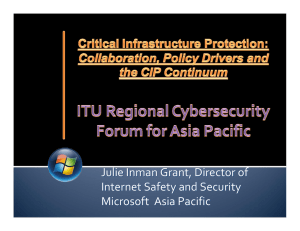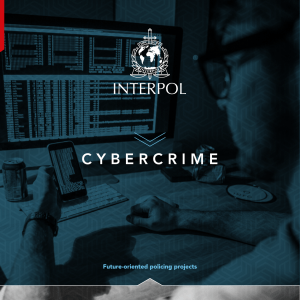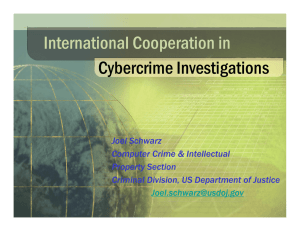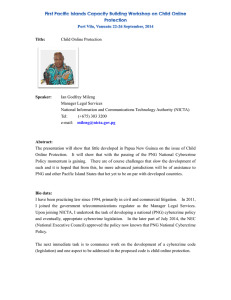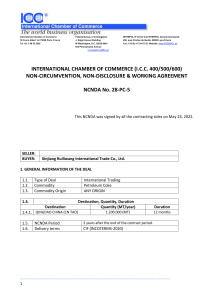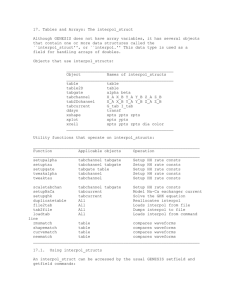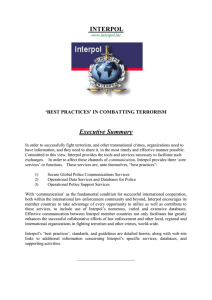Cyber Centre INTERPOL’s ITU Regional Cybersecurity Forum for the Americas
advertisement
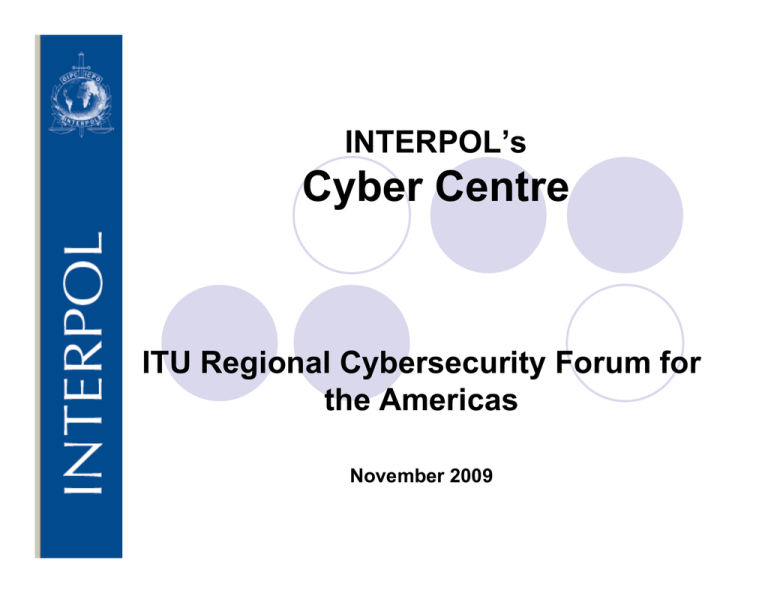
INTERPOL’s
Cyber Centre
ITU Regional Cybersecurity Forum for
the Americas
November 2009
Overview
z A glance at INTERPOL
z Introduction to Cybercrime situation
z INTERPOL’s response:
{Cybercrime Initiative
{Cybercrime Strategy
INTERPOL – a global organization
Created in 1923, INTERPOL is the world’s largest
international police organization, with 188
member countries
General Secretariat in Lyon, France,
six Regional Bureaus, one Liaison
Office, and Special Representatives of
INTERPOL to the United Nations and to the
European Union in Brussels.
Four official languages: Arabic, English, French
and Spanish
A National Central Bureau (NCB) in each member
country
Introduction to Cybercrime Situation
z Internet, a new global scenario
{Real presence Æ vurtual presence
{Hacking, trojan, malware, DOS attack,
skimming…
{Risks?
Past state Æ Future state?
Pr(Xn+1= xn+1│X1 = x1, X2 = x2, X3 =
x3,…, Xn=xn) = Pr(Xn+1= xn+1│Xn= xn)
Cybercrime Initiative
● Supports decisions made at 2008 General
Assembly - creation of the Forensics Unit
● The threat is global and expanding
● Member countries vary widely in their capacity,
technology, and connectivity
Cybercrime Initiative: A Process
Template
Identification of the Initiative
External Scanning and SWOT Analysis
Idea Development/Proposed Formulation of Initiative
Stakeholder Input
Idea Refinement and Expert Review
Partners and Funding Source Development
Initiative Execution Plan
Cybercrime Strategy:
Five Focus Areas
Focus Area One: Computer Forensics, Analysis
of Evidence, and Online Investigations
Mission Focus
Computer Forensics & Analysis of Evidence
a) Provide core team with technical equipment and subject matter expertise
b) Establish case officers to liaise with associated crime verticals
Online Monitoring & Investigations
a) Establish common protocols for monitoring
b) Provide direct support to member countries
c) Preemptively alert member countries of cyber threats
d) Serve as a trusted broker to expedite sensitive information exchange
Focus Area 2 – Training, Capacity Building, and InHouse Support
Mission Focus
Focus Area 2 will expand cyber‐based training initiatives, enhance member country capabilities, expand regional partnerships, and provide support for internally‐oriented elements of the Center.
1.
2.
Training & Capacity Building
a) Establish critical mass of accredited trainers
b) Provide supplement equipment resources on-the-ground
c) Promote remote e-learning opportunities
d) Advise private industry on how to properly connect with law enforcement on
select cyber incidents
e) Promote regional partnerships to scale / replicate internal training efforts
f) Subsidize training for less developed countries
g) Set initial standards and/or guidelines in cooperation with Training Office
In-House Support
a) Author basic principles for first responders
b) Develop common techniques to ensure anonymous network monitoring
c) Implement professional development to keep pace with technological change
10
Focus Area 3 – Cyber Domain Situational Awareness
Mission Focus
Focus Area 3 will establish a common operating picture (both internal and external)
for emerging threats to global networks while leveraging INTERPOL’s existing
communications and data exchange infrastructure.
1.
External Component
a) Connect domestic cybercrime units to I-24/7 network
b) Establish incoming link to private Secure Operating Centers to eliminate prevailing
disconnect between responding to an incident (temporary patch) and investigating
an incident (long-term prevention)
c) Enable rapid-action response (see potential legal constraint)
d) Institute early warning system (e.g., purple notices)
e) Catalog incoming data from the private sector
2.
Internal Component
a) Match compatible databases and aggregate trends observed in crime verticals
alongside general cyber trends
b) De-conflict “blue-on-blue” operations
11
Focus Area 4 – Build Public-Private Partnerships
Mission Focus
Focus Area 4 will encourage INTERPOL to invest energy in organizations that sit at
the nexus between policy and practice, where it can effectively enhance its position
and reputation as the global authority on cybercrime.
1.
2.
3.
Academia
a) Construct “cloud” of cyber subject matter experts (networked think tank model)
International Organizations
a) Seed select organizations with presence to establish INTERPOL as the law
enforcement authority in cybercrime (e.g., IMPACT)
b) Continue to influence the policy landscape and forthcoming legislative proposals
related to cyber (EC)
c) Expand focus to other regional groups
Private Organizations
a) Establish data link with Internet Service Providers / DNS Registry Systems
b) Establish data link with Banking and Financial System
c) Specialized law enforcement data (e.g., Cymru)
d) Computer Emergency Response Teams
e) SANS Institute (Internet Storm Center)
12
Focus Area 5 – Review and Evaluate the Impact of
Emerging Technology on Law Enforcement
Mission Focus
z
Focus Area 5 will attempt to mitigate the gap that has grown between the emerging
threat and countervailing solutions by investing time in understanding solutions
before they come to market.
zUnderstand emerging technology in the context of its impact on law enforcement
(advanced previews)
z Evaluate and endorse hardware / software tools to ensure a progressive baseline for IT
security
z Survey development efforts within the law enforcement community and publish new or
innovative investigative techniques
z Continue to monitor and advise on malicious toolsets and techniques that are emerging
from the hacker community
13
“We are what we repeatedly do.
Excellence then, is not an act,
but a habit”.
Aristotle
Challenges Ahead
zSharing information
zProcedures
zStandardized laws
zPredicting emerging risks
zStakeholders
QUESTIONS?
Jaime Ansieta
Financial and High Tech Crime
ICPO INTERPOL
j.ansieta@interpol.int
